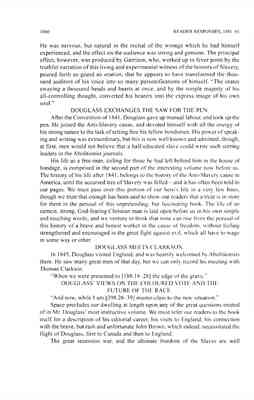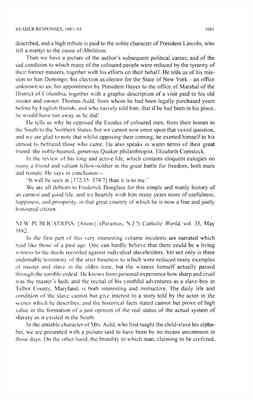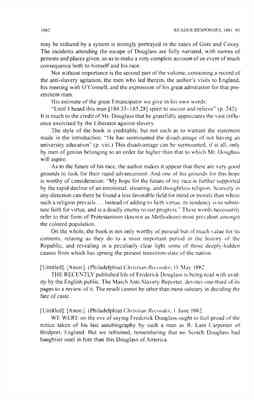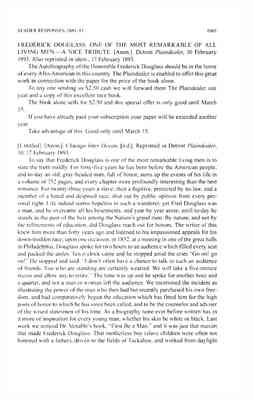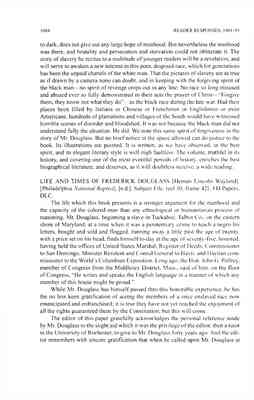Pages
16
1060
READER RESPONSES, 1881-93
He was nervous, but natural in the recital of the wrongs which he had himself experienced, and the effect on the audience was strong and genuine. The principal effect, however, was produced by Garrison, who, worked up to fever point by the truthful narration of this living and experimental witness of the horrors of Slavery, poured forth so grand an oration, that he appears to have transformed the thousand auditors of his voice into so many personifications of himself. "The orator swaying a thousand heads and hearts at once, and by the simple majesty of his all-controlling thought, converted his hearers into the express image of his own soul."
DOUGLASS EXCHANGES THE SAW FOR THE PEN.
After the Convention of 1841, Douglass gave up manual labour, and took up the pen. He joined the Anti-Slavery cause, and devoted himself with all the energy of his strong nature to the task of setting free his fellow bondsmen. His power of speaking and writing was extraordinary, but this is now well known and admitted; though. At first, men would not believe that a half-educated slave could write such stirring leaders in the Abolitionist journals.
His life as a free-man, toiling for those he had lcft behind him in the house of bondage, is comprised in the second part of the interesting volume now before us. The history of his life after 1841, belongs to the history of the Anti-Slavery cause in America, until the accursed tree of Slavery was felled -- and it has often been told in our pages. We must pass over this portion of our hero's life in a very few lines. Though we trust that enough has been said to show our readers that a treat is in store for them in the perusal of this unpretending, but fascinating book. The life of an earnest, strong, God-fearing Christian man is laid open bcfore us in his own simple and touching words; and we venture to think that none can rise from the perusal of this history of a brave and honest worker in the cause of freedom, without feeling strengthened and encouraged in the great fight against evil, which all have to wage in some way or other.
DOUGLASS MEETS CLARKSON.
In 1845, Douglass visited England, and was heartily welcomed by Abolitionists there. He saw many great men of that day, but we can only record his meeting with Thomas Clarkson.
"When we were presented to [ 188.18 - 28 J the edge of the grave."
DOUGLASS' VIEWS ON THE COLOURED VOTE AND TIIE FUTURE OF THE RACE.
"And now, while I am [298.26 -39] master-class to the new situation." Space precludes our dwelling at length upon any of the great questions treated of in Mr. Douglass' most instructive volume. We must refer our readers to the book itself for a description of his editorial career, his visits to England, his connection with the brave, but rash and unfortunate John Brown, which indeed, necessitated the flight of Douglass, first to Canada and then to England.
The great secession war, and the ultimate freedom of the Slaves are well
17
READER RESPONSES, 1881-93
1061
described, and a high tribute is paid to the noble character of President Lincoln, who fell a martyr to the cause of Abolition.
Then we have a picture of the author's subsequent political career, and of the sad condition to which many of the coloured people were reduced by the tyranny of their former masters, together with his efforts on their behalf. He tells us of his mission to San Domingo; his election as elector for the State of New York - an office unknown to us; his appointment by President Hayes to the office of Marshal of the District of Columbia, together with a graphic description of a visit paid to his old master and owner. Thomas Auld, from whom he had been legally purchased years before by English friends, and who naively told him, that if he had been in his place, he would have run away as he did!
He tells us why he opposed the Exodus of coloured men, from their homes in the South to the Northern States; but we cannot now enter upon that vexed question, and we are glad to note that whilst opposing their coming, he exerted himself to his utmost to befriend those who came. He also speaks in warm terms of their great friend, the noble-hearted, generous Quaker philanthropist, Elizabeth Comstock.
In the review of his long and active life, which contains eloquent eulogies on many a friend and valiant fellow-soldier in the great battle for freedom, both male and female. He says in conclusion: "lt will he seen in [1372.35 - 374.7] than it is to me."
We are all debtors to Fredenck Douglass for this simple and manly history of an earnest and good life, and we heartily wish him many years more of usefulness, happiness, and prosperity, in that great country of which he is now a free and justly honoured citizen.
PUBLICATIONS. [Anon.]. (Paramus. N.J.?) Catholic World, vol. 35, May 1882.
In the first part of this very interesting volume incidents are narrated which read like those of a past age. One can hardly believe that there could be a living witness to the deeds recorded against individual slaveholders. Yet not only is there undeniable testimony of the utter baseness to which were reduced many examples of master and slave in the olden time. But the witness himself actually passed through the terrible ordeal. He knows from personal experience how sharp and cruel was the master's lash; and the recital of his youthful adventures as a slave-boy in Talbot County, Maryland, is both interesting and instructive. The daily life and condition of the slave cannot but give interest to a story told by the actor in the scenes which he describes; and the historical facts stated cannot but prove of high value in the formation of a just opinion of the real status of the actual system of slavery as it existed in the South.
In the amiable character of Mrs. Auld, who first taught the child-slave his alphabet, we are presented with a picture said to have been by no means uncommon in those days. On the other hand, the brutality to which man, claiming to be civilized,
18
1062
READER RESPONSES , 1881-93
may be reduced by a system is strongly portrayed in the cases of Gore and Covey. The incidents attending the escape of Douglass are fully narrated, with names of persons and places given, so as to make a very complete account of an event of much consequence both to himself and his race.
Not without importance is the second part of the volume, containing a record of the anti-slavery agitation, the men who led therein, the author's visits to England, his meeting with O'Connell, and the expression of his great admiration for that preeminent man.
His estimate of the great Emancipator we give in his own words : "Until I heard this man [184.35~ 185.28] spirit to succor and relieve" (p. 242). It is much to the credit of Mr. Douglass that he gratefully appreciates the vast influence exercised by the Liberator against slavery.
The style of the book is creditable, but not such as to warrant the statement made in the introduction: "He has surmounted the disadvantage of not having an university education" (p. viii.) This disadvantage can be surmounted, if at all. Only by men of genius belonging to an order far higher than that to which Mr. Douglass will aspire.
As to the future of his race, the author makes it appear that there are very good grounds to look for their rapid advancement. And one of his grounds for this hope is worthy of consideration: "My hope for the future of my race is further supported by the rapid decline of an emotional, shouting, and thoughtless religion. Scarcely in any direction can there be found a less favorable field for mind or morals than where such a religion prevails .... Instead of adding to faith virtue, its tendency is to substitute faith for virtue, and is a deadly enemy to our progress. "These words necessarily refer to that form of Protestantism ( known as Methodism) most prevalent amongst the colored population.
On the whole, the book is not only worthy of perusal but of much value for its contents, relating as they do to a most important period in the history of the Republic, and revealing in a peculiarly clear light some of those deeply-hidden causes from which has sprung the present transition-state of the nation.
[Untitled]. [Anon.]. (Philadelphia) Christian Recorder, 11 May 1882 .
THE RECENTLY published life of Frederick Douglass is being read with avidity by the English public. The March Anti-Slavery Reporter, devotes one-third of its pages to a review of it. The result cannot be other than most salutary in deciding the fate of caste.
[Untitled] . [Anon.]. ( Philadelphia) Christian Recorder, 1 June 1882.
WE WERE on the eve of saying Frederick Douglass ought to feel proud of the notice taken of his last autobiography by such a man as R. Lant Carpenter of Bridport, England. But we refrained, remembering that no Scotch Douglass had haughtier steel in him than this Douglass of America.
19
READER RESPONSES, 1881 - 93
1063
FREDERICK DOUGLASS. ONE OF THE MOST REMARKABLE OF ALL LIVING MEN. ~ A NICE TRIBUTE. [Anon.). Detroit Plaindealer, 10 February 1893. Also reprinted in idem., 17 February 1893.
The Autobiography of the Honorable Frederick Douglass should be in the home of every Afro-American in this country. The Plaindealer is enabled to offer this great work in connection with the paper for the price of the book alone.
To any one sending us S2.5O cash, we will forward them The Plaindealer one year and a copy of this excellent race book.
The book alone sells for S2.50 and this special offer is only good until March 15.
If you have already paid your subscription your paper will be extended another year.
Take advantage of this. Good only until March 15.
[Untitled]. [Anon.]. Chicago Inter Ocean. [n.d.). Reprinted in Detroit Plaindealer, 10. 17 February 1893.
To say that Frederick Douglass is one of the most remarkable living men is to state the truth mildly. For forty-five years, he has been before the American people, and to-day an old, gray-headed man, full of honor, sums up the events of his life in a volume or 752 pages and every chapter more profoundly interesting than the best romance. For twenty-three years a slave; then a fugitive, protected by no law, and a member of a hated and despised race, shut out by public opinion from every personal right. Life indeed seems hopeless to such a wanderer, yet Fred Douglass was a man, and he overcame all his besetments, and year by year arose, until to-day he stands as the peer of the best among the Nation's grand men. By nature, and not by the refinements or education did Douglass reach out for honors. The writer of this knew him more than forty years ago and listened to his impassioned appeals for his down-trodden race; upon one occasion in 1852, at a meeting in one of the great halls in Philadelphia. Douglass spoke for two hours to an audience which filled every seat and packed the aisles. Ten o'clock came and he stopped amid the cries "Go on! go on!" He stopped and said: "I don't often have a chance to talk to such an audience of friends. You who arc standing are certainly wearied. We will take a five-minute recess and allow any to retire." The time was up and he spoke for another hour and a quarter, and not a man or woman left the audience. We mentioned the incident as illustrating the power of the man who then had but recently purchased his own freedom and had comparatively begun the education which has fitted him for the high posts of honor to which he has since been called. and to be the counselor and adviser or the wisest statesmen of this time. As a biography none ever before written has in it more of inspiration for every young man, whether his skin be white or black. Last week we noticed Dr. Venable's book, "First Be a Man." and it was just that maxim that made Frederick Douglass. That motherless boy (slave children were often not honored with a father), driven to the fields of Tuckahoe and worked from daylight
20
1064
READER RESPONSES. 1881 - 93
to dark, does not give out any large hope of manhood. But nevertheless the manhood was there, and brutality and persecution and starvation could not obliterate it. The story of slavery he recites to a multitude of younger readers will be a revelation, and will serve to awaken a new interest in this poor, despised race, which for generations has been the unpaid chattels of the white man. That the pictures of slavery are as true as if drawn by a camera none can doubt and in keeping with the forgiving spirit of the black man- no spirit of revenge crops out in any line. No race so long misused and abused ever so fully demonstrated in their acts the prayer of Christ - "Forgive them, they know not what they do" - as the black race during the late war. Had their places been filled by Italians or Chinese or Frenchmen or Englishmen or even Americans, hundreds of plantations and villages of the South would have witnessed horrible scenes of disorder and bloodshed. It was not because the black man did not understand fully the situation. He did. We note this same spirit of forgiveness in the story of Mr. Douglass. But no brief notice in the space allowed can do justice to the book. Its illustrations are pointed. It is written, as we have observed, in the best spirit, and its elegant literary style is well nigh faultless. The volume, truthful in its history, and covering one of the most eventful periods of history, enriches the best biographical literature. and deserves, as it will doubtless receive a wide reading.
LIFE AND TIMES OF FREDERICK DOUGLASS [Heman Lincoln Wayland]. [Philadelphia National Baptist], [n.d.]. Subject File. reel 10. frame 421. FD Papers. DLC.
The life which this book presents is a stronger argument for the manhood and the capacity of the colored man than any ethnological or humanitarian process of reasoning. Mr. Douglass, beginning a slave in Tuckahoe, Talbot Co. on the eastern shore of Maryland, at a time when it was a penitentiary crime to teach a negro his letters. Bought and sold and flogged, running away a little past the age of twenty with a price set on his head, finds himself to-day at the age of seventy-five, honored having held the offices of United States Marshal, Register of Deeds, Commissioner to San Domingo, Minister Resident and Consul General to Hayti, and Haytian commissioner to the World's Columbian Exposition. Long ago, the Hon. John G. Palfrey, member of Congress from the Middlesex District Mass., said of him, on the floor of Congress. "He writes and speaks the English language in a manner of which any member of this house might be proud."
While Mr. Douglass has himself passed thro this honorable experience, he has the no less keen gratification of seeing the members of a once enslaved race now emancipated and enfranchised. It is true they have not yet reached the enjoyment of all the rights guaranteed them by the Constitution; but this will come.
The editor of this paper gratefully acknowledges the personal reference made by Mr. Douglass to the slight aid which it was the privilege of the editor. then a tutor in the University of Rochester, to give to Mr. Douglass forty years ago. And the editor remembers with sincere gratification that when he called upon Mr. Douglass at
